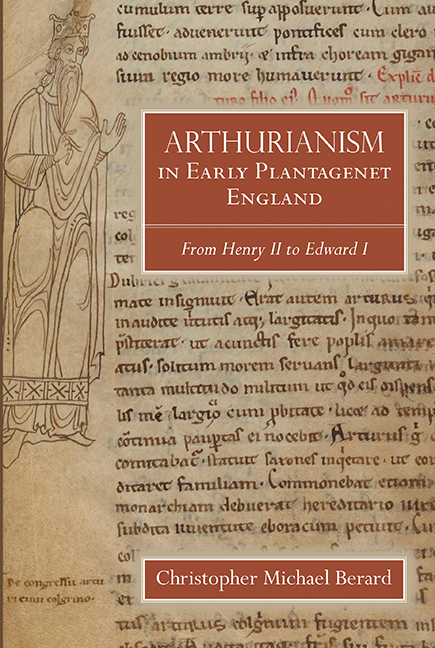Book contents
- Frontmatter
- Contents
- List of abbreviations
- Genealogical Table of the Sovereigns of England from William I to Edward II
- Introduction
- 1 Arthurianism during the reign of Henry II, 1154–1189
- 2 Arthurianism during the reign of Richard I, 1189–1199
- 3 Arthurianism during the reign of King John, 1199–1216
- 4 Arthurianism during the reign of Henry III, 1216–1272
- 5 Arthurianism during the reign of Edward I, 1272–1307
- Conclusion
- Bibliography
- Acknowledgments
- Index
- Miscellaneous Frontmatter
Conclusion
Published online by Cambridge University Press: 25 March 2020
- Frontmatter
- Contents
- List of abbreviations
- Genealogical Table of the Sovereigns of England from William I to Edward II
- Introduction
- 1 Arthurianism during the reign of Henry II, 1154–1189
- 2 Arthurianism during the reign of Richard I, 1189–1199
- 3 Arthurianism during the reign of King John, 1199–1216
- 4 Arthurianism during the reign of Henry III, 1216–1272
- 5 Arthurianism during the reign of Edward I, 1272–1307
- Conclusion
- Bibliography
- Acknowledgments
- Index
- Miscellaneous Frontmatter
Summary
The Welsh chronicler and ‘soldier of Calais’, Elis Gruffydd (1490–1552), observes in his world history (Creation–1552) that the English criticize the Welsh for taking excessive pride in Arthur and, in defense of his countrymen, he delivers this riposte:
Ac etto j mae yn vwy j son wyntt [sc. y Sayson] amdanno ef [sc. Arthur] no nnyni [sc. y Kymru]; kanis j maentt twy [sc y Sayson] yn dywedud ac yn koelio yn gadarn j kyuyd ef [sc. Arthur] dracheuyn j vod yn vrenin. Yr hrain yn i hoppiniwn a ddywaid j vod ef ynn kysgu mewn googoff dan vryn garllaw Glasynbri. Ac yn wir pe gellid hroddi koel j ai[r] ymrauaelion bobl o'r ardal hwnw, yvo ymddangoses ac a ymddiuannodd a llawer o bobyl mewn llawer modd hryuedd er ys trychant o vylnyddoedd.
(And yet they [sc. the English] talk much more about him [sc. Arthur] than we [sc. the Welsh] do; for they [sc. the English] say and firmly believe that he [sc. Arthur] will rise again to be king. They in their opinion say that he is sleeping in a cave under a hill near Glastonbury. And indeed, if credence could be given to the word of various people of that region, he has for three hundred years been appearing to and conversing with many people in many a marvellous way.)
Gruffydd's observation seems to have been as true for the twelfth century as it was for the sixteenth. We do not have any early Welsh, Cornish, or Breton statements of belief in King Arthur's survival, but, beginning with the Gesta regum Anglorum (c. 1125) of William of Malmesbury, we encounter a series of claims made by Anglo-Norman and Continental writers that the Welsh, Cornish, and Bretons believed Arthur had never died and would return.
The English and Continental formulation of exspectare Arthurum, which was exploited by the court writers of Henry II, implies that Arthur escaped the way of all flesh and was a special messianic figure for his Brittonic kinsmen. This idea is at odds with the fundamental Christian teaching that Jesus Christ is the one true messiah and that salvation comes through him alone.
- Type
- Chapter
- Information
- Arthurianism in Early Plantagenet EnglandFrom Henry II to Edward I, pp. 301 - 308Publisher: Boydell & BrewerPrint publication year: 2019

